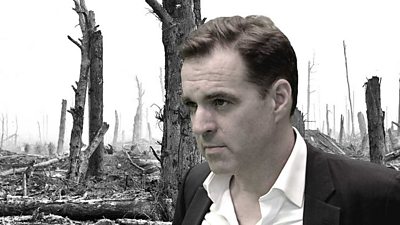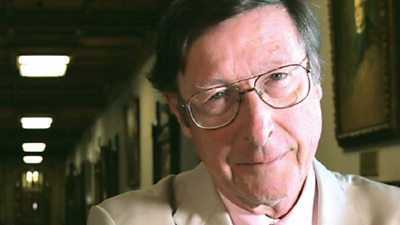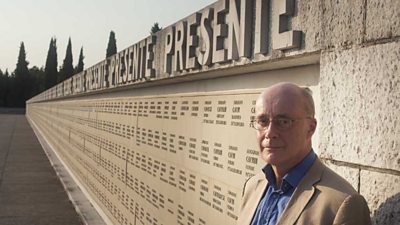World War One: Historical Debate & Discussion
Historical debate & discussion programming to mark the centenary of World War One.

ΒιΆΉΤΌΕΔ Two
Was the Great War a great mistake? In this one-off 90-minute programme for ΒιΆΉΤΌΕΔ Two, in front of an audience including many of the leading historians of WW1, Harvard historian Professor Niall Ferguson offers a different perspective on World War One and argues that Britain’s decision to enter the war was a tragic error.
World War One was one of the great turning points of modern history. We know where the war started: in the Bosnian capital of Sarajevo on 28 June 1914, when a Bosnian Serb named Gavrilo Princip murdered the heir to the Austro-Hungarian dual monarchy. But how and why did this crisis in the Balkans escalate into a bloody global conflagration? Professor Ferguson questions whether Britain really did have to fight a war against Germany.
Using an innovative combination of graphics, Professor Ferguson argues that much of the responsibility for the scale of the conflict lies with the British. He suggests that Britain’s decision to enter the war in 1914 was not merely tragic for those who lost their lives; it was also a catastrophic error that unleashed an era of totalitarianism and genocide around the world.
During the final 30 minutes of the programme, Professor Ferguson debates with some of the UK's top academics who have studied the First World War.
World War One on the ΒιΆΉΤΌΕΔ is the biggest and most ambitious season ever commissioned. Comprising over 130 new commissions and over 2,500 hours of programming across four years, the season will offer a unique way to understand a war that changed our world, reflecting the centenary from every perspective; locally, nationally and internationally, and utilising the full range of the ΒιΆΉΤΌΕΔ’s services.
AT

ΒιΆΉΤΌΕΔ Two
ΒιΆΉΤΌΕΔ Two’s The Necessary War, presented by historian Sir Max Hastings, explains with piercing clarity why the British were right to enter World War One and oppose Germany’s war aims.
Sir Max outlines the case for the British Empire’s declaration of war on 4 August 1914. He debates the common argument that the price of participation was so appalling that no purpose could have conceivably justified it. He also traces the complex origins of the war to show that it was not a ‘war by accident’ but a conflict which the Germans, even if they were not directly responsible for its outbreak, could have prevented if they chose. And the film paints a picture of a German empire, under Kaiser Wilhelm II, determined on primacy whether by peaceful means or, if necessary, by war.
Max Hastings argues that for a great power such as Britain, which valued and guarded its freedom and independence above all, the conflict was neither avoidable nor futile.
Blakeway Productions - 1x60 minutes.
AT
To War
ΒιΆΉΤΌΕΔ Parliament
‘The lamps are going out all over Europe,’ declared British Foreign Secretary Sir Edward Grey on the evening of 3 August 1914.
That day he had told a packed House of Commons that Britain was honour-bound to support Belgium and France against any aggression by Germany.
It was mere days after the assassination of Archduke Franz Ferdinand in Sarajevo but the momentum for conflict had been building for years. Britain faced a tangle of treaty obligations and was engaged in an arms race with Germany.
Could the Liberal government have done more to prevent the conflict or was it distracted by its long battle over Irish ΒιΆΉΤΌΕΔ Rule? Mark D’Arcy reports from Westminster on the great Parliamentary speeches and political manoeuvrings which led Britain to war.
ΒιΆΉΤΌΕΔ News Productions.
AH2

ΒιΆΉΤΌΕΔ Two
Historian David Reynolds explores the legacy of the Great War in a new three-part series for ΒιΆΉΤΌΕΔ Two. He traces how the conflict haunted the generation who lived through it and how it shaped the peace that followed, often in surprising ways.
For Reynolds, Britain’s experience of the war’s aftermath was peculiar. Unlike other European combatants, the British escaped revolution, militarism and political polarisation, muddling on with coalition politics under a crusty monarch, George V, who was rebranded as a symbol of the nation. And, while the Great War shattered old continental empires, allowing nationalists to seize their moment, the British Empire expanded and England’s union with Scotland and Wales was strengthened. The grim exception would be Ireland, where the blood sacrifices of 1916 left scars that endure to this day.
Examining the conflict’s impact on politics, identity and national memory, Reynolds builds a new and powerful argument about the shadow cast by the Great War and the forces it unleashed which are still grappled with today.
ClearStory - 3x60 minutes.
AT
Rethinking The Culture Of World War One
ΒιΆΉΤΌΕΔ Radio 3
ΒιΆΉΤΌΕΔ Radio 3’s cultural strands will be probing and challenging received ideas about the history of World War One.
In World War One – Cradle Of Jazz? Alyn Shipton argues that the war was the unintended midwife to the birth of jazz, sending African-American troops across the USA to Europe and, with them, their revolutionary music.
For Life In The Tomb, Angela de Angelis adapts Greece’s most famous novel about the war, bringing to life a lesser-known picture of the Great War, far from the Western Front, in the Balkans.
A major 30-part Essay series, Minds At War, paints portraits of leading thinkers from the arts and sciences including Thomas Mann, Otto Dix and Rose Macaulay, and charts how the war changed their approach to key questions of the day.
And Radio 3’s speech strands – including Night Waves and the Sunday Feature – host a series of documentaries, debates and features about how the war revolutionised arts and ideas.
ΒιΆΉΤΌΕΔ Productions / Unique Productions (Cradle Of Jazz) / Somethin’ Else Productions (Life In The Tomb).
MC4
Woman's Hour
ΒιΆΉΤΌΕΔ Radio 4
On ΒιΆΉΤΌΕΔ Radio 4, Woman’s Hour explores how the war affected women both in public and private life. Drawing on the most recent research, the programme reflects the social change that was accelerated though the war years and brings context to the portrayal of women’s lives in the ΒιΆΉΤΌΕΔ Front drama.
Other aspects of the war will be explored in Radio 4’s other news and specialist strands.
ΒιΆΉΤΌΕΔ Productions.
CD3
The Great War Of Words
ΒιΆΉΤΌΕΔ Radio 4
As Europe reflects on World War One, Michael Portillo explores the last battleground of the war – the charred intellectual landscape left by generations of historians, politicians and cultural commentators as they fought for a century to interpret, appropriate and revise the meaning of the war.
This series looks at the distinct phases in the intellectualising of the conflict and traces the image and the idea of the war through its interpretations and misinterpretations – across time and across the globe. Listeners will hear how in Britain, the Empire, France, Germany and America the understanding of the war became politicised, polarised and ultimately distorted. The words and deeds of academics, directors, politicians and veterans come to life as the series explores the shaping of the collective memory of the war.
The series will address the question of whose version of the war we are really commemorating.
ΒιΆΉΤΌΕΔ Productions.
CD3